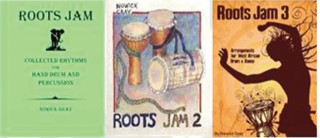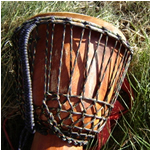Lesson Four: Improvisations and Variations
- Improv Variations
- Improv Variations, Revisited
- Ashiko Samba
- Counting Up
- Choice of Feel
- Summer Green Special
- Gumboot Dance
- September Turnaround
Solo practice gives much opportunity for experimentation, taking off from traditional patterns into new variations. samba accompaniment:
_______ _______
| | | | | | | |
P - P d G - G D
![]() Click
for sound:
RealAudio - Track2-9
Click
for sound:
RealAudio - Track2-9
usually described as a 2/4 .
This rhythm can be extended to a 5, 6, 7
_______ _______ ___
| | | | | | | | | | 5/8
P P d G G d g d
_____ _____ _____ _____
| | | | | | | | | | | | 6/8
P P d G G d g d P d
P P d G P d P d G T
_____________ _____________
| | | | | | | | | | | | | | 7/8
P P d G G T g d P d g d
_______ _______ _______ _______
| | | | | | | | | | | | | | | | 4/4
P P d G G T g d P d g T g d
P P d G G T g D P d G T g D Roll with Me
P P d G P d g T P T P d G T Edging Max
As you can see, adding your own titles is the next logical step in creating your own rhythms.
One useful strategy for getting a handle on new improvisations, or to compose interesting new rhythms, is to break a pattern down to see what each hand is doing. I developed and refined the following pattern using this method. The root of it is that familiar samba accompaniment, again (first two
_______ _______ _______ _______ | | | | | | | | | | | | | | | | P - P d G - G D g - P d G D g d
![]() Click
for sound:
RealAudio - Track2-10
Click
for sound:
RealAudio - Track2-10
_______ _______ _______ _______ | | | | | | | | | | | | | | | | P P G G g P G g right hand - d - D - d D d left hand
By focussing on one hand at a time, the hands may learn quicker and you can also appreciate the distinct pattern of each. Like playing polyrthythms in a group: each hand plays its own part and together, they make a dynamic sound.
The previous pattern leads quite naturally into the Ashiko Samba. This rhythm is based on one taught by Babatunde Olatunji, a longer sequence he demonstrates as a precursor to the Latin sambas. Compare, play along with, or back and forth between
_______ _______ _______
_______
| | | | | | | | | | | | | | | |
P - P d G - G D g - P d G D g d Latin samba accomp.
g - P T G - G T - d P T G - G T Ashiko Samba
Ashiko Samba - ![]() Click
for sound:
RealAudio -
Track2-11
Click
for sound:
RealAudio -
Track2-11
Notice the difference between
the straight-ahead roll of the first, and the distinctive samba
"hitch" in the middle of the second which is emphasized
by the "T -".
This sequence began one afternoon out of
the blue, practicing a standard 6/8 accompaniment pattern until
a double bass invited itself in the back door...
_____ _____ _____
_____ _____
| | | | | | | | | | | | | | |
T - d P - g T - d P - G - G -
The result is a count of five (five threes),
Notice how different the same rhythm feels
with just one less beat:
_____ _____ _____
_____ ___
| | | | | | | | | | | | | |
T - d P - g T - d P - G - G
Having done this much with it, the next logical
step is to try the four-four or 16:
_____ _____ _____
_____ _______
| | | | | | | | | | | | | | | |
T - d P - g T - d P - G - G - g
Note the unusual division into five bars here. This sixteen-beat phrase comes from a feel of 3+3+3+3+4, instead of the conventional 4+4+4+4. Play one of each simultaneously and
At this point my solo improvisation became more analytical, as I wanted to explore all the possibilities in
_____ _____ _____ _____
_____ _____
| | | | | | | | | | | | | | | | | |
T - d P - g T - d P - G - G d g d g
![]() Click
for sound:
RealAudio - Track2-12
Click
for sound:
RealAudio - Track2-12
This one, like the others, has a mixed feel. But notice how regular the count is: six threes. Play this with a conventional 6/8 of twelve beats and watch them cycle together
At this point it gets pretty esoteric in terms of the total count. Still it's an interesting opportunity to blend familiar elements together in a new arrangement. In the first of these, a 19-count (9+2+8) pattern, notice the steady 8-count
_____
_____ _____ ___ _______ _______
| | | | | | | | | | | | | | | | | | |
T - d P - g T - d P - G - G - d g d g
In the final example, a seventeen (9+2+6), we drop a couple of notes to bring back the possibility of a three
_____ _____ _____ ___
_____ _____
| | | | | | | | | | | | | | | | |
T - d P - g T - d P - G - d g d g
In drumming as in love, feel is everything. It's not what you play, it's how you play it. With this in mind, "Sandia."
_____
_____
| | | | | |
g - D g - -
G - d G - -
P - d P - -
Each version carries a different feel.
Within each of these choices is further choice, a refinement of the desired feel. We fine-tune by varying the hand-pattern.
_____ _____
| | | | | |
P - d P - -
The dominant, slap note is played with the same (right) hand. This kind of repetitive motion gives it what I call a "vertical" feel. Compare what happens when the
_____ _____
| | | | | |
P - g T - -
Technically the same rhythm: but it feels "rolling" motion.
Teachers give different emphasis to this idea of the importance of handing, depending on the learner's level, the traditional requirements for the feel of a particular rhythm, and perhaps the inclinations of the individual teacher. Tempo and hand fatigue plays a role, too, especially if you're playing extra notes for the rests. In that case a strict alternation of hands on every beat is usually the most practical approach.
Yet another blend of three and four feels
presents itself. Begin with a nine-beat phrase in three. Notice
the pronounced difference in feel (a chill wind?) when you switch
from the roundish three to the more squarish feel of three paired
notes. Then play with this difference by playing the two parts in
sequence.
_____ _____ _____
| | | | | | | | |
D - G T - P d -(g)
_____ ___ ___ ___
| | | | | | | | |
D - G T P d g T P
Summer's short;
watch out for fall.
Did somebody say "morphological resonance"?
Once started, it seems this three-four thing keeps coming up. The
latest iteration comes by the name of "Gumboot Dance,"
from South Africa. Apologies for lack of video: you'll just have
to put on the shit-kickers and do it!
_______ _______
_______ _______
| | | | | | | | | | | | | | | |
D G d g D g d G d G d g D g d G
Here's a pattern which can be lengthened like the autumn nights. The key feature is an offbeat slap-and-double-bass combination in the middle, which rolls the rhythm over from a three-feel
Here's the core of it notated in 4/4.
_______ _______ _______
_______
| | | | | | | | | | | | | | | |
Then add on to stretch the 16 beats to 18,
_______ _______ _______
_______ ___
| | | | | | | | | | | | | | | | | |
_______ _______ _______
_______ _______
| | | | | | | | | | | | | | | | | | | |
T - - - - - P - G - G - d g d g D g d -
_______
_______ _______ _______ _______ ___
| | | | | | | | | | | | | | | | | | | | | |
T - - - - - P - G - G - d g d g D g d - D -
_______ _______ _______
_______ _______ _______
| | | | | | | | | | | | | | | | | | | | | | | |
T - - - - - P - G - G - d g d g D g d - D - D -
Here's a variation to play with, using the
Split it in half, and play together as 2 parts; or, play with two drums as a round, with drum 1 starting T and drum 2 starting on the first d.
Let me know which one of all these patterns you like the best!
Return to Top
 Go to Rhythms
of the Week, Page One
Go to Rhythms
of the Week, Page One
 Go to Rhythms
of the Week, Lesson Two
Go to Rhythms
of the Week, Lesson Two
 Go to Rhythms
of the Week, Lesson Three
Go to Rhythms
of the Week, Lesson Three
 Go to Rhythms
of the Week, Lesson Five
Go to Rhythms
of the Week, Lesson Five
 Go
to Rhythms of the Week, Lesson Six
Go
to Rhythms of the Week, Lesson Six
 Go
to Rhythms of the Week, Lesson Seven
Go
to Rhythms of the Week, Lesson Seven
 Go
to Rhythms of the Week, Lesson Eight
Go
to Rhythms of the Week, Lesson Eight
 Go
to Rhythms of the Week, Lesson Nine
Go
to Rhythms of the Week, Lesson Nine
See lots more rhythm notation and drum lessons in my Roots Jam rhythm books, with optional audio files (CD or mp3). And read my latest tips and insights about drumming: African Drumming Blog. Learn from my early learning experiences as a hand drummer, with the free ebook, Friday Night Jam.
 Cougar WebWorks
Cougar WebWorks 


